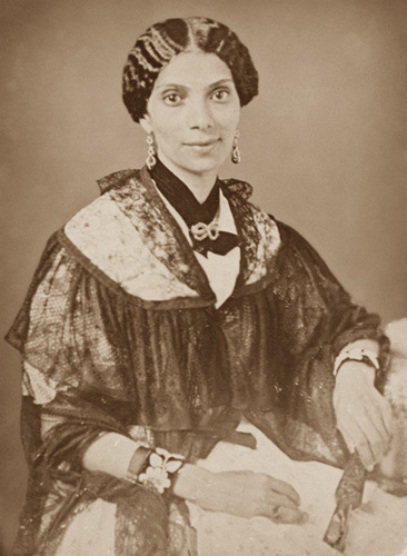A Woman of Many Firsts: Vernie Merze Tate
Mary Davenport
Miss Ruth M. Lowery
Columbus Johnson
Michele Clark
Harriet "Hattie" Redmond
Anna Mac Clarke
Helen 'Curl' Harris
They Were the State of Virginia's First
Elizabeth Jennings Graham: Refused to Leave A Whit…
Eliza Suggs: Shadow and Sunshine
Anna Louise James
Lutie A Lytle: First African American to be admitt…
Mary A. Burwell
Christine Moore Howell
Ethelyn Taylor Chisum
Give All Women the Right to Vote
Atholene Peyton
Sarah Parker Remond
Josephine Turpin Washington
Louise De Mortie
Lucy Hughes
Lovie Yancey
Florestine Perrault Collins
Melissa Fuell-Cuther
First African American Female Disc Jockey in Phill…
Annie Mae Manigault
Lucretia ‘Aunt Lou’ Marchbanks
Caldonia Fackler "Cal" Johnson
Maude Brooks Cotton
Josephine Baker
Lafayette Reid Mercer
A. Burrell
Ora Brown Stokes
Rose McClendon
Ethel Waters
Willa B Brown
Reckless Eyeballing: The Matt Ingram Case
Center Market Vendor
J. Steward Davis
Elisa Greenwell
Stone Sisters
William P Newman
Hughes Allison
See also...
Authorizations, license
-
Visible by: Everyone -
All rights reserved
-
21 visits
Mary Peake


Mary Smith Kelsey Peake (1823 - 1862), was born in Norfolk, Virginia the daughter of a free black woman and a prominent Englishman. When she was six, Mary was sent to live with her aunt and uncle to attend a school for African Americans in Alexandria, which was then a part of the District of Columbia. During her schooling, she probably learned mathematics, reading, writing, and sewing skills. Peake returned to Norfolk in 1839.
In 1847 Peake moved with her family to Hampton. While supporting herself as a dressmaker, she secretly began teaching from her home, instructing African Americans of all ages. She also founded the Daughters of Zion to provide aid to the poor and the sick. In 1851 she married formerly enslaved, Thomas Peake.
Early in the Civil War, the Peake family home was destroyed when Confederate forces torched Hampton. Many of the displaced African American families from Hampton were forced to seek refuge at nearby Fort Monroe. In September 1861, Peake started a school near the fortress, within the present grounds of Hampton University. Her enrollment grew from six to more than fifty students in a matter of days.
Peake was a dedicated instructor, creating a school for adults in the evenings and continuing to teach despite failing health, even when was she was bedridden. She died of tuberculosis in February 1862 and is buried in Elmerton Cemetery in Hampton, Virginia. Her school was one of the first of its kind and served as a model for a number of other schools that taught African Americans throughout the South in Union-occupied territory. Today, the city of Hampton honors Peake with a school, a street, and a park.
Sources: Mary S. Peake: The Colored Teacher at Fortress Monroe by Rev. Lewis C. Lockwood from Michigan State University Libraries Exhibition Shaping the Values of Youth: Sunday School Books in 19th Century America; Hampton University Archives
In 1847 Peake moved with her family to Hampton. While supporting herself as a dressmaker, she secretly began teaching from her home, instructing African Americans of all ages. She also founded the Daughters of Zion to provide aid to the poor and the sick. In 1851 she married formerly enslaved, Thomas Peake.
Early in the Civil War, the Peake family home was destroyed when Confederate forces torched Hampton. Many of the displaced African American families from Hampton were forced to seek refuge at nearby Fort Monroe. In September 1861, Peake started a school near the fortress, within the present grounds of Hampton University. Her enrollment grew from six to more than fifty students in a matter of days.
Peake was a dedicated instructor, creating a school for adults in the evenings and continuing to teach despite failing health, even when was she was bedridden. She died of tuberculosis in February 1862 and is buried in Elmerton Cemetery in Hampton, Virginia. Her school was one of the first of its kind and served as a model for a number of other schools that taught African Americans throughout the South in Union-occupied territory. Today, the city of Hampton honors Peake with a school, a street, and a park.
Sources: Mary S. Peake: The Colored Teacher at Fortress Monroe by Rev. Lewis C. Lockwood from Michigan State University Libraries Exhibition Shaping the Values of Youth: Sunday School Books in 19th Century America; Hampton University Archives
- Keyboard shortcuts:
Jump to top
RSS feed- Latest comments - Subscribe to the comment feeds of this photo
- ipernity © 2007-2024
- Help & Contact
|
Club news
|
About ipernity
|
History |
ipernity Club & Prices |
Guide of good conduct
Donate | Group guidelines | Privacy policy | Terms of use | Statutes | In memoria -
Facebook
Twitter
